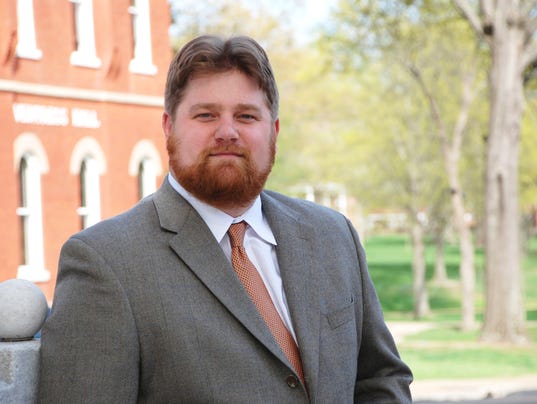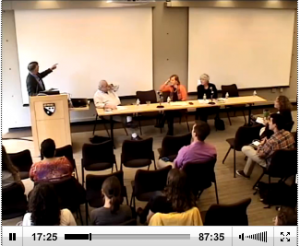I was struck this morning by this excerpt from Paulo Freire’s Pedagogy of the Oppressed:
I shall start by reaffirming that humankind, as beings of the praxis, differ from animals, which are beings of pure activity. Animals do not consider the world; they are immersed in it. In contrast, human beings emerge from the world, objectify it, and in so doing can understand it and transform it with their labor.
Animals, which do not labor, live in a setting which they cannot transcend. Hence, each animal species lives in the context appropriate to it, and these contexts, while open to humans, cannot communicate among themselves.
Animals are “beings of pure activity,” but animals “do not labor.” Only human beings – through their self-awareness, through their naming of the world – only human beings labor and thus transform the world.
Harry Boyte has written extensively about “public work,” an approach which seeks to move civic activity beyond the voluntary sector, to bring work and workplaces into an understanding of active citizenship.
This approach powerfully considers the ability of people to physically and creatively transform their world – not only through their thoughts and ideas, but through their work: through their work imagining, building, and creating something together. This public work, Boyte argues, is the true heart of civic efforts, the core of what it means to live and co-create together.
Freire’s understanding seems importantly related, yet subtly different.
Freire argues that “human activity is theory and practice; it is reflection and action. It cannot…be reduced to either verbalism or activism.”
in many ways, that argument seems near the core to an understanding of public work. To be is not simply to be, to think does not simply imply I am. To be, to think, to exist as a free and conscious agent – this is synonymous with action.
I think. I am. I do.
For the “fully human,” as Freire would say, for the liberated person, these things are synonymous. They cannot be separated.
For Freire, the power of “public work” comes from the connection of thinking and doing:
…the revolutionary effort to transform these structures radically cannot designate its leaders as its thinkers and the oppressed as mere doers….true commitment to the people…cannot fail to assign the people a fundamental role in the transformation process. The leaders cannot treat the oppressed as mere activists to be denied the opportunity of reflection and allowed merely the illusion of acting.
While Freire never uses the phrase “public work,” all this seems very much in line with the views of Boyte and other proponents of the approach.
But Freire adds another piece to the puzzle. For Freire, communication is a critical piece of understanding, it is a critical piece of liberation. In his view, human beings first express their freedom as they name their world. As beings of consciousness, humans recognize the world around them. By naming, they identify themselves as as free beings of agency, with power to shape the world around them.
This power of communication has important implications for the value of deliberative dialogue as a tool to transform, as a tool of liberation, as a tool of action.
Dialogue with the people is radically necessary to every authentic revolution, Freire writes.
Sooner or later, a true revolution must initiate a courageous dialogue with the people. Its very legitimacy lies in that dialogue. It cannot fear the people, their expression, their effective participation in power. It must be accountable to them, must speak frankly to them of its achievements, its mistakes, its miscalculations and its difficulties.
And make no mistake, this dialogue isn’t “just talk.” For Freire, this dialogue is the embodiment of action:
Let me emphasize that my defense of the praxis implies no dichotomy by which this praxis could be divided into a prior stage of reflection and a subsequent stage of of action. Action and reflection occur simultaneously…Critical reflection is also action.
The revolution is made neither by the leaders for the people no by the people for the leaders, but by both acting together in unshakeable solidarity. This solidarity is born only when the leaders witness to it by their humble, loving, and courageous encounter with the people. Not all men and women have sufficient courage for this encounter – but when they avoid encounter they become inflexible and treat others as mere objects; instead of nurturing life, the kill life; instead of searching for life, they flee from it. And these are oppressor characteristics.
Some may think that to affirm dialogue – the encounter of women and men in the the world in order to transform the world – is naively and subjectively idealistic. There is nothing, however, more real or concrete than people in the world and with the world, than humans with other humans – and some people against others, as oppressing and oppressed classes.






 First, we have officially changed the former “Student” membership category to “Student/Young Professional.” The new membership type will extend the benefits of discounted annual NCDD membership dues to rising members of the D&D community who are no longer students, but who didn’t exactly start rolling in the dough right after finishing school — as well as new professionals who are just starting to make their way in the field.
First, we have officially changed the former “Student” membership category to “Student/Young Professional.” The new membership type will extend the benefits of discounted annual NCDD membership dues to rising members of the D&D community who are no longer students, but who didn’t exactly start rolling in the dough right after finishing school — as well as new professionals who are just starting to make their way in the field. Got an idea for what NCDD can do for new or young professionals in our field? Please leave us a suggestion or idea in the comments section! Also, if you notice your membership or some part of our site still uses the “Student” label rather than “Student/Young Professional,” please send a note about it to joy@ncdd.org.
Got an idea for what NCDD can do for new or young professionals in our field? Please leave us a suggestion or idea in the comments section! Also, if you notice your membership or some part of our site still uses the “Student” label rather than “Student/Young Professional,” please send a note about it to joy@ncdd.org.




